Here’s a surprising stat: 40% of organizations don’t have a centralized place to store their contracts. That number alone shows how many teams are still relying on scattered folders, inboxes, and manual tracking to manage agreements.
When contracts live in different places, it becomes hard to keep up with renewals or even know who’s responsible for what. Missed deadlines, version confusion, and limited visibility are all too common. The more your team grows, the messier it gets.
That’s why more companies are turning to contract repository software, which is a purpose-built system that brings all your agreements into one structured, searchable space.
Paired with contract management software, it can automate reviews, monitor activity, and make it easier for legal, finance, and business teams to stay aligned.
In this article, we’ll break down what contract repository software is, how legal teams use it, and why it’s become a must-have for modern organizations.
Remember when storing files meant rows of filing cabinets, folders stacked high, and sticky notes marking what was where?
Then came digital storage: the shared drives, email threads, and cloud folders. It was a step up, sure, but chaos still crept in. Files got mislabeled, versions overlapped, and people kept asking, “Is this the latest one?”
A contract repository is a centralized place where all your contracts live in one clean, organized space. Every contract has its own spot. You can find them by name, date, client, renewal status, and so much more. Plus, it keeps track of what’s inside, who last touched it, and when it needs eyes on it.
It’s simple: a contract repository helps you stay organized, stay informed, and stay on top of your contracts. Essentially, it’s the foundation for better contract management, whether you're a solo legal counsel or part of a big legal team.
Now that storing contracts in one central place makes sense, the next step is using software that makes it work day-to-day.
A contract repository is a tool built to help you manage contracts properly. For example, you can upload files, sort them with tags or folders, see who made changes, and set reminders for key dates like renewals or terminations.
The software gives you features like:
Everything’s built around keeping contracts safe and easy to manage without having to babysit every file. Because it’s built for contracts, not just general storage, it actually fits how legal, sales, and procurement teams work.
Tools like Google Drive, OneDrive, or Dropbox are built for general file storage. They let you upload, share, and sort documents, but that’s where it ends.
You can’t tag contracts with key details, set renewal alerts, or easily see who made changes. Searching by filename only gets you so far, and version tracking usually depends on file names or folder structure.
On the other hand, contract repository software is made for managing contracts. You can store agreements, search full text, filter by status or party, and keep everything tied to a clear timeline.
It also tracks version history automatically, controls who can access each file, and alerts you when key dates are coming up.
It’s the difference between just keeping files and actually managing your contract process.
Legal teams manage contracts daily—drafting, reviewing, tracking deadlines, and controlling access. Contract repository software helps streamline those tasks without relying on manual work or scattered folders.
Bottom line? It saves you time, reduces headaches, and gives you way more confidence managing your contracts.

Once you’ve seen how legal teams use it day to day, the benefits are pretty clear. But beyond those use cases, it’s worth stepping back and looking at the bigger picture.
Here’s what a good contract repository really brings to the table.
Now that we’ve covered the key benefits and everyday use cases of contract repository software, let’s take a look at some of the best options available.
Aline sets itself apart as a contract management solution that helps you stay ahead of risks, deadlines, and routine tasks without the complexity of traditional tools.
With a sharp focus on AI-driven insights, Aline goes beyond basic storage, turning your agreements into a strategic resource.
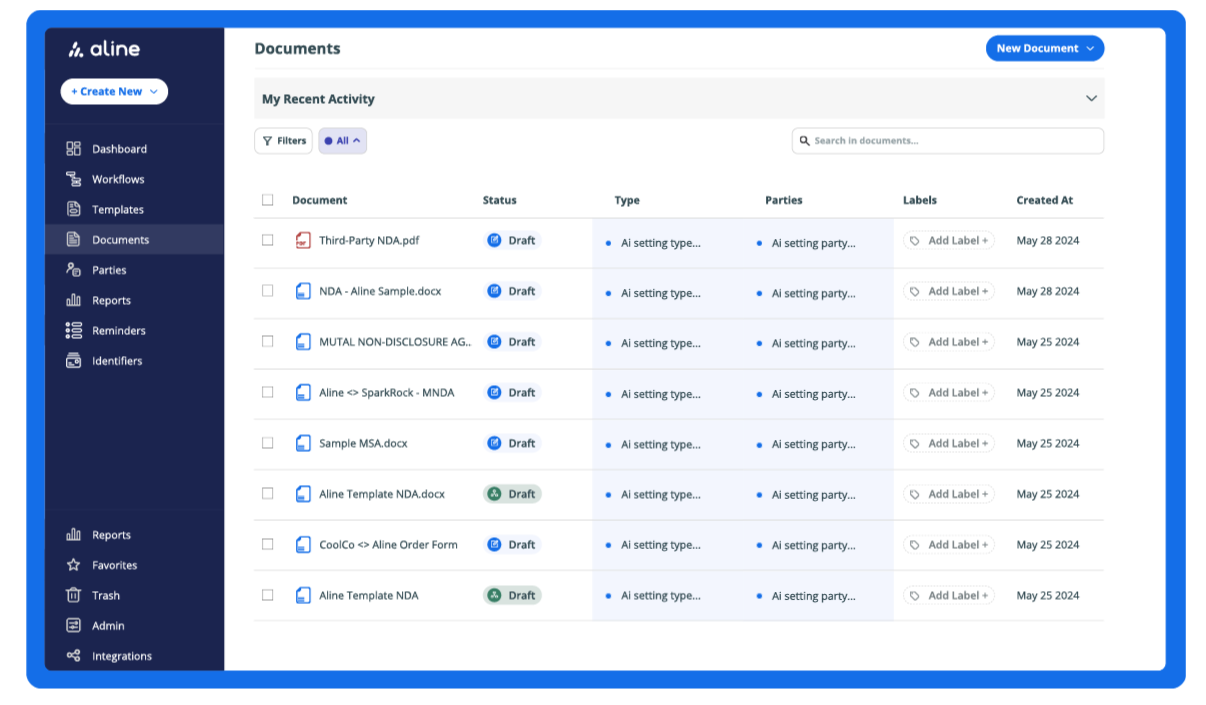
The newly launched AI Repository brings everything together in one place. You can upload your agreements, connect them to your file storage systems, and let Aline’s AI extract over 15 key terms, dates, and contractual obligations in seconds.
Whether you're tracking expirations, managing renewals, or handling large-scale contract drafting, Aline gives you the visibility and automation you need to minimize risk and unlock the transformative potential of your contract data.
With seamless integrations, real-time AI reports, and automated approval workflows, Aline empowers teams to stay in sync, no matter what tools they’re using. From negotiation to execution, it gives you a smarter way to manage your contractual obligations and business relationships.
ContractWorks is a contract management solution focused on simplifying contract storage, tracking, and execution. It’s built for companies that need a secure, straightforward way to manage agreements without investing in overly complex systems.
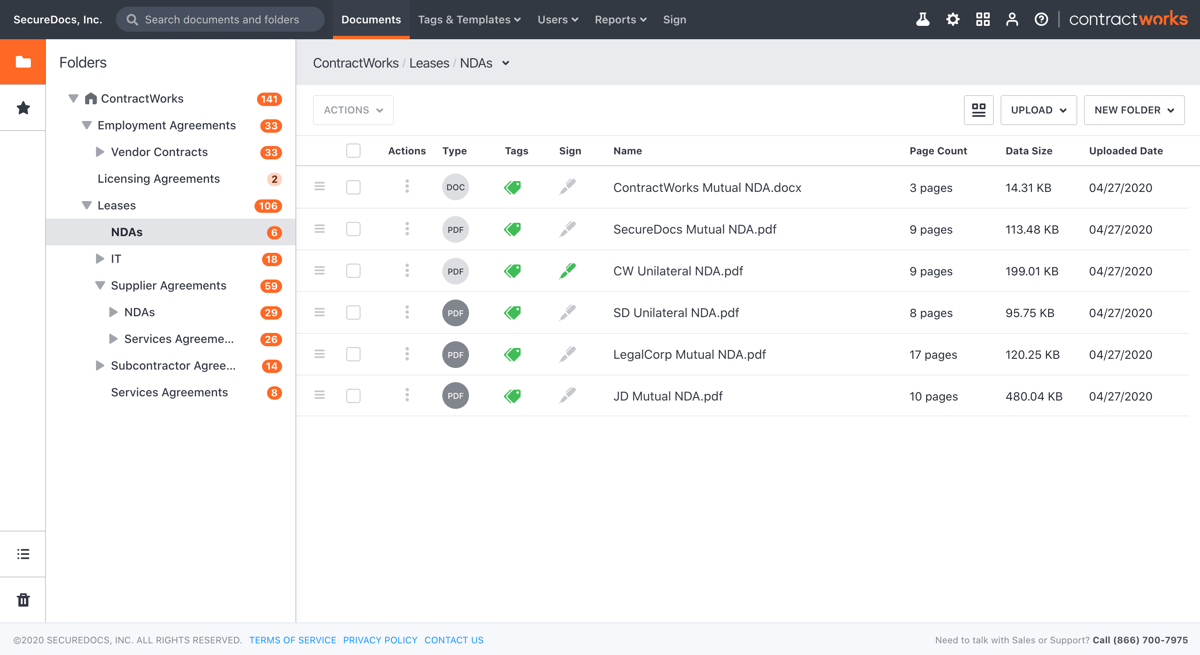
ContractWorks emphasizes practical features aimed at helping teams manage contract renewals, manage signatures, and control access.
The platform includes searchable storage, electronic signature tools, and basic reporting features. It also offers role-based permissions and audit trails to support security and mitigate risks.
While it doesn’t provide advanced AI features or contract drafting tools, it delivers value for businesses that want a reliable system for storing and tracking agreements.
PandaDoc is a document automation platform that includes contract management features alongside broader document creation and e-signature software.
It’s designed primarily for sales and business teams looking to streamline contract creation, approval, and execution within a single platform.
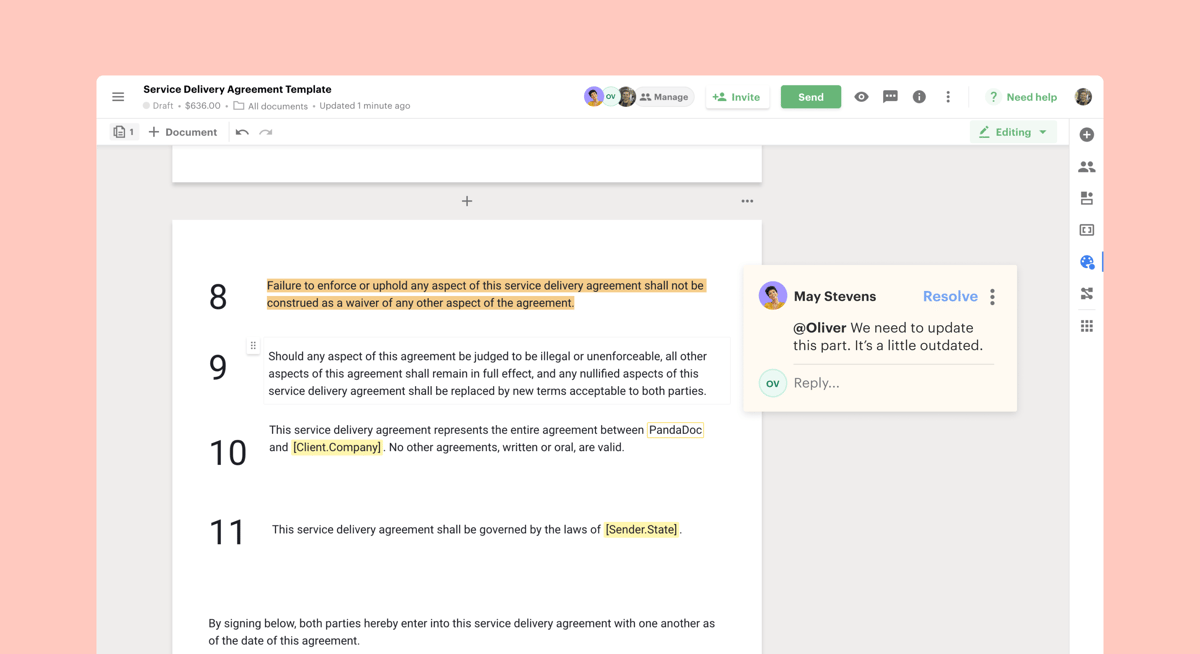
Unlike dedicated contract lifecycle management systems, PandaDoc focuses on ease of use for business documents by offering customizable templates, drag-and-drop editing, and built-in e-signatures.
It supports workflows for contract approvals and includes basic tracking features like document status updates and audit trails. While it handles contract storage, its strength lies more in document generation and sales enablement than in advanced contract management.
Juro positions itself as a platform built for contract collaboration, storing documents, and simplifying the way stakeholders work together on contracts. It’s a browser-based tool where drafting, editing, negotiating, and signing all happen in one shared workspace.
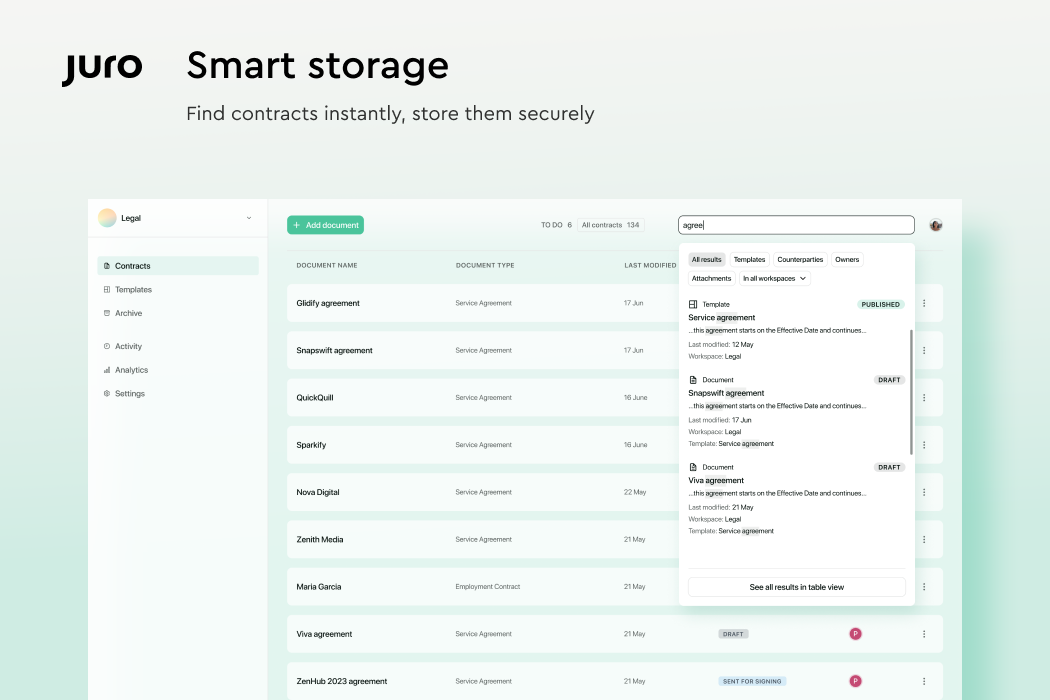
Where Juro stands out is in handling multi-stakeholder reviews. Everyone involved can comment, suggest edits, and approve contracts within the same system.
That collaboration is backed by customizable workflows and audit logs designed to help companies meet compliance requirements without slowing things down.
Juro isn’t trying to be a heavy-duty CLM or a simple e-signature tool. It’s built for teams that want to work faster together, keep everything transparent, and avoid the usual contract chaos.
Concord is a contract management platform designed to simplify contract creation, negotiation, execution, and tracking within a single system. It focuses on helping teams manage contracts collaboratively while maintaining visibility and control throughout the process.
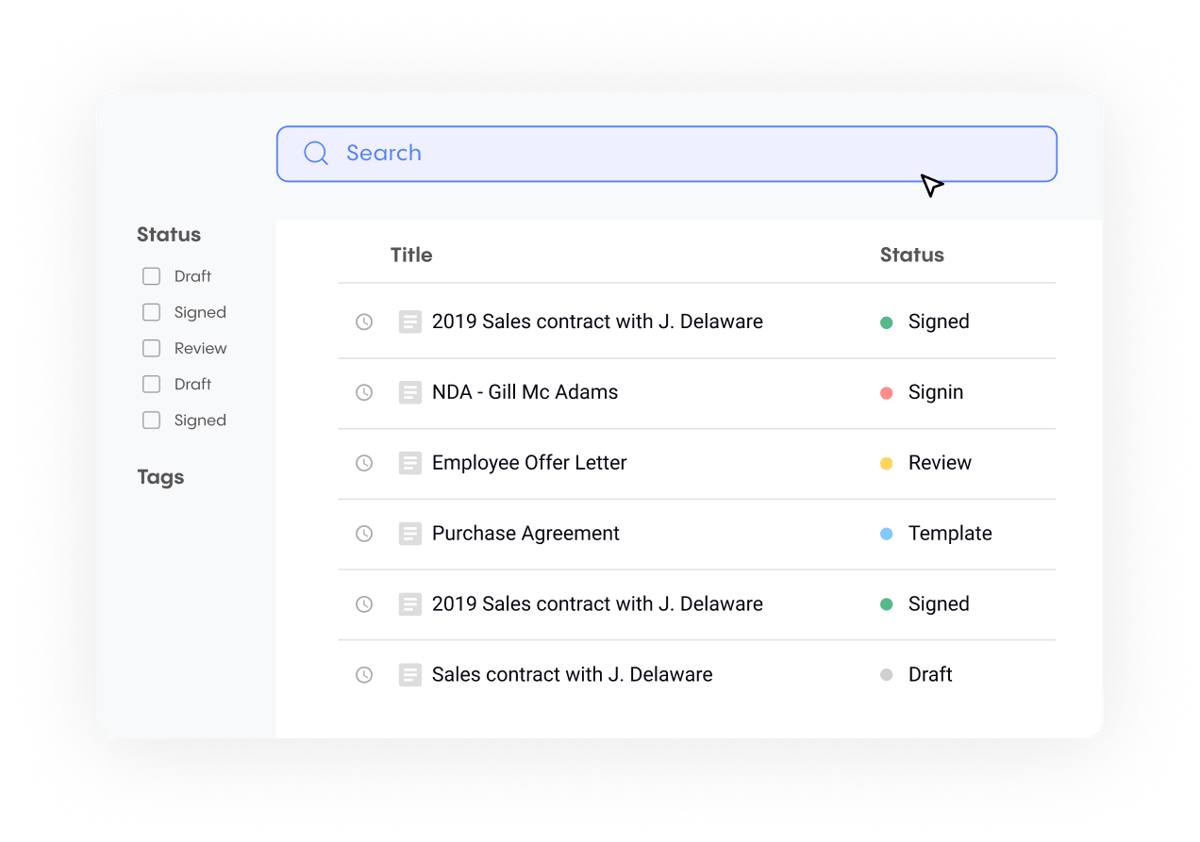
The platform offers a centralized contract repository with built-in editing, negotiation, and contract approval tools.
Its approval workflows allow multiple stakeholders to review and sign off on agreements, while audit trails and access controls help companies meet compliance requirements and mitigate risks.
Concord also supports contract renewals with customizable reminders, so key dates don’t slip through the cracks.
You’ve seen what a proper contract repository can do—less guesswork, fewer delays, and a whole lot more confidence in your process. But if you’re still piecing things together with folders and manual tracking, it’s time for something better.
Aline’s AI Repository adds a whole new layer of power to your contract management process. It doesn't just store your agreements; it reads them, understands them, and helps you act on them.

You can upload files, extract over 15 key contract terms in seconds, and search across thousands of agreements instantly. Set AI-powered reminders, generate custom reports, and connect everything to your file storage with zero disruption.
Whether you're managing ten contracts or ten thousand, Aline gives you the clarity and control you need to keep moving forward.
Start your trial today or request a demo and see what Aline’s AI Repository can do for you.
The best contract management software with a repository includes tools that organize, store, and track contracts in one central location. Platforms like Aline offer searchable repositories that make it easier to manage versions, monitor renewals, and access key contract data without relying on scattered folders.
The best software depends on your team size, workflow needs, and budget. If you're looking for a balance of usability, advanced features, and smart search, tools like Aline stand out. Look for platforms that support automated workflows, contract storage, reminders, and reporting to improve contract performance over time.
A contract repository is a centralized system where all agreements are stored, in order, and tracked. It gives your team easy access to contract data, supports collaboration, and keeps everything aligned across departments.
Pricing varies widely depending on features, users, and deployment. Some platforms offer entry-level pricing for small teams, while others charge based on usage or integrations. A good buyer’s guide can help you compare tools and find the right fit for your needs. Many vendors offer free demos, resources, and support to help you choose the right solution for your team.
CMS (content management system) is designed for managing digital content like blogs or web pages. CLM (contract lifecycle management) software is built specifically for managing contracts across their full lifecycle. It’s a growing market with tools evolving to meet the future needs of legal and business teams.
Contract management software helps teams create, store, organize, and track contracts throughout their lifecycle. It supports everything from drafting and approvals to renewals and compliance. With features like search, alerts, version control, and audit logs, it reduces manual work and gives better visibility into obligations, timelines, and contract performance.

